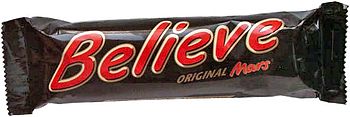 |
| Cover via Amazon |
 |
| Mars bar (UK style). Photo by sannse. (Photo credit: Wikipedia) |
 |
| A US Mars bar (Photo credit: Wikipedia) |
 |
| Mars Believe Bar Limited Edition Football World Cup 2006 (Photo credit: Wikipedia) |
 |
| English: A US Mars bar that has been split in half. (Photo credit: Wikipedia) |
The taste for chocolate is one of the most fundamental and ineradicable human urges
ROBERT COLVILE
features@mediacorp.com.sg
London – I once met a nutritionist – one of these irritatingly healthy, glowing-skin types – who swore that she could eliminate the craving for chocolate. If you adhered to her chosen diet plan, she insisted, your body would return to a state of such perfect balance, be so in tune with nature and all its wonderful goodness, that the mere thought of a Mars bar would be enough to prompt mild nausea.
This struck me then, and strikes me now, as arrant nonsense. As far as I can tell, the taste for chocolate is one of the most chocolate fundamental and ineradicable human urges. Lord knows, I’ve tried to eradicate it. In fact, I’ve spent much of this week testing my taste for chocolate to destruction, after being left (in the wake of a birthday picnic) with a pile of confectionery that included a plate of brownies, assorted chocolate fingers, mini-rolls, squares of millionaire’s shortbread, and two whole chocolate cakes. After a few days of profiteroles for breakfast and scattering goodies around the office, I just about got through the backlog. But I could still murder a Kit Kat.
MERE BRAIN CHEMISTRY?
You can, of course, explain all this in terms of brain chemistry. Journalist Damian Thompson has written powerfully about the addiction mechanisms built into our cravings for little sugary treats, about how we become hooked on the hit of pleasure delivered by a cupcake frosted with towering icing. Sugar, as we all know, is an incredible mood-lifter: Another co-worker confessed recently – and was there a hint of pride alongside the shame? – that he has taken, when feeling low, to devouring an entire block of mint Viennetta in a single sitting.
It’s true that when you’re tired, or stressed, the siren lure of chocolate becomes ever more difficult to resist. The latest sneaky innovation is “sharing bags”, a section of the market in some places that’s going gangbusters. The ads tend to depict thin, happy people passing them round with beaming smiles, yet I have yet to meet anyone who has actually shared one, save under duress. Most are guzzled through in a single sitting, delivering bite after bite of chocolately goodness. (In fact, I’m prepared to offer a bar of Green & Black’s Maya Gold to anyone who has ever had the willpower to use the “resealable” bags to defer the pleasure till later.)
MORE ELEMENTAL
But I don’t think we’re just going through the neurochemical motions. I think there’s something deeper, more elemental, at work. With other products – wine or beer, for example – we gradually drift away from the cheap stuff, our tastes moving upmarket with our income. Sure enough, many confectioners now dwell on their bars’ cocoa percentage and the beans’ origins in a remote Peruvian village, presenting their choccies as the artisanal equivalent of a particularly spectacular Pouilly-Fuisse.
But while I’ll happily devour a bar of 70 per cent Venezuelan, there are many more times when all I want is to get hold of a little brown square of Cadbury’s, and let it do its Proustian work. I’m hardly alone: Indeed, the new musical of Charlie And The Chocolate Factory has done such boffo box-office because Roald Dahl tapped in, with his peculiar genius, to exactly this sensation, setting up Wonka’s chocolate as the ultimate sweet, the Platonic ideal of chocolate.
Think of the almost pornographic way in which Dahl tantalises the reader with the thought of Wonka’s factory- first the view from outside, then the taste of that first bar of Whipple-Scrumptious Fudgemallow Delight, then (once the doors creak open) the smell from the great Chocolate Room wafting down the corridor, until finally Charlie and the other children are unleashed to eat their fill. The book is, in theory, a parable about the virtues of restraint over indulgence. But if you had a golden ticket, you’d be scoffing your face alongside Augustus Gloop in a heartbeat. THE DAILY TELEGRAPH
Taken from TODAY Saturday Edition, June 29, 2013





